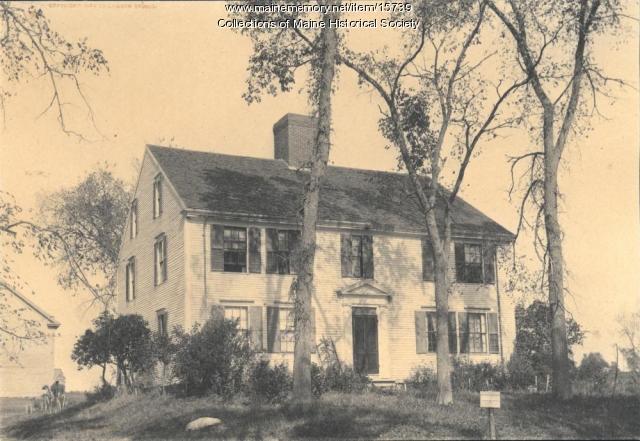Keywords: Maine Art
- Historical Items (4833)
- Tax Records (11)
- Architecture & Landscape (1514)
- Online Exhibits (154)
- Site Pages (510)
- My Maine Stories (79)
- Lesson Plans (30)
Lesson Plans
Your results include these lesson plans. Your results include these lesson plans.
Lesson Plan
Longfellow Studies: The Elms - Stephen Longfellow's Gorham Farm
Grade Level: 6-8, 9-12
Content Area: English Language Arts, Social Studies
On April 3, 1761 Stephen Longfellow II signed the deed for the first 100 acre purchase of land that he would own in Gorham, Maine. His son Stephen III (Judge Longfellow) would build a home on that property which still stands to this day. Judge Longfellow would become one of the most prominent citizens in Gorhams history and one of the earliest influences on his grandson Henry Wadsworth Longfellow's work as a poet.
This exhibit examines why the Longfellows arrived in Gorham, Judge Longfellow's role in the history of the town, Henry Wadsworth Longfellow's vacations in the country which may have influenced his greatest work, and the remains of the Longfellow estate still standing in Gorham today.
Lesson Plan
Portland History: "My Lost Youth" - Longfellow's Portland, Then and Now
Grade Level: 6-8, 9-12
Content Area: English Language Arts, Social Studies
Henry Wadsworth Longfellow loved his boyhood home of Portland, Maine. Born on Fore Street, the family moved to his maternal grandparents' home on Congress Street when Henry was eight months old. While he would go on to Bowdoin College and travel extensively abroad, ultimately living most of his adult years in Cambridge, Massachusetts, he never forgot his beloved Portland.
Years after his childhood, in 1855, he wrote "My Lost Youth" about his undiminished love for and memories of growing up in Portland. This exhibit, using the poem as its focus, will present the Portland of Longfellow's boyhood. In many cases the old photos will be followed by contemporary images of what that site looked like 2004.
Following the exhibit of 68 slides are five suggested lessons that can be adapted for any grade level, 3–12.
Lesson Plan
Longfellow Studies: The Village Blacksmith - The Reality of a Poem
Grade Level: 6-8, 9-12
Content Area: English Language Arts, Social Studies
"The Village Blacksmith" was a much celebrated poem. Written by Henry Wadsworth Longfellow, the poem appeared to celebrate the work ethic and mannerisms of a working man, the icon of every rural community, the Blacksmith. However, what was the poem really saying?
Lesson Plan
Longfellow Studies: Longfellow Meets German Radical Poet Ferdinand Freiligrath
Grade Level: 9-12
Content Area: English Language Arts, Social Studies
During Longfellow's 1842 travels in Germany he made the acquaintance of the politically radical Ferdinand Freiligrath, one of the influential voices calling for social revolution in his country. It is suggested that this association with Freiligrath along with his return visit with Charles Dickens influenced Longfellow's slavery poems. This essay traces Longfellow's interest in the German poet, Freiligrath's development as a radical poetic voice, and Longfellow's subsequent visit with Charles Dickens. Samples of verse and prose are provided to illustrate each writer's social conscience.
Lesson Plan
Portland History: Signalizing and Non-Verbal Communications at the Portland Observatory
Grade Level: 3-5
Content Area: English Language Arts, Social Studies, Visual & Performing Arts
This lesson is an overview of Captain Lemuel Moody's (builder of the Observatory) signaling system used at the Portland Observatory. Activities range from flag making to mapping and journal writing. The "Signals" slide show allows students to look at Captain Moody's general and private signals notebooks. Students are asked a series of questions about the notebooks and Moody's signaling system allowing for a better understanding of the principles behind the Observatory.
Lesson Plan
Portland History: Construction, Preservation and Restoration of the Portland Observatory
Grade Level: 3-5, 6-8
Content Area: Science & Engineering, Social Studies
Included here are activities based in economics, mathematics, physics, social studies, civics and language arts. Students can debate the issues surrounding preservation and urban development as well as the changing value of money.






